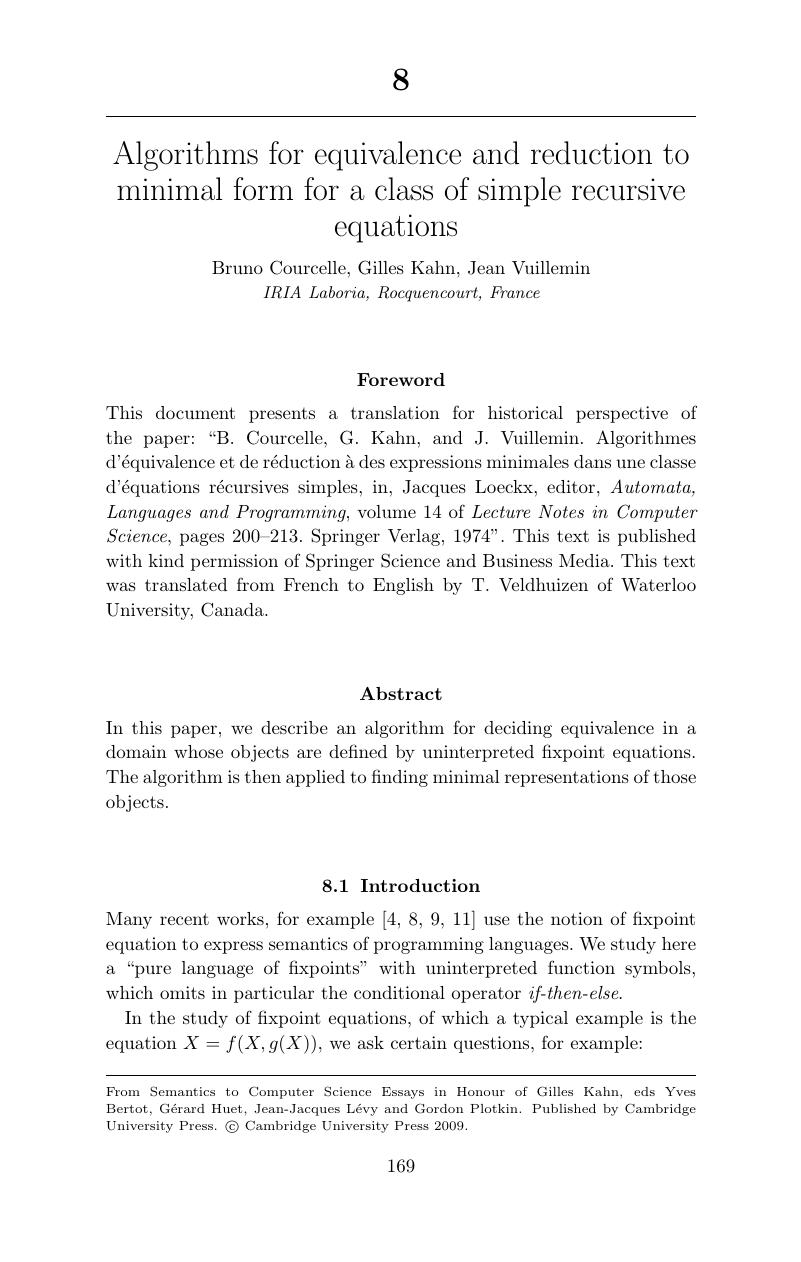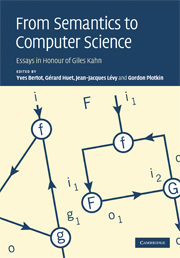Book contents
- Frontmatter
- Contents
- List of contributors
- Preface
- 1 Determinacy in a synchronous π-calculus
- 2 Classical coordination mechanisms in the chemical model
- 3 Sequential algorithms as bistable maps
- 4 The semantics of dataflow with firing
- 5 Kahn networks at the dawn of functional programming
- 6 A simple type-theoretic language: Mini-TT
- 7 Program semantics and infinite regular terms
- 8 Algorithms for equivalence and reduction to minimal form for a class of simple recursive equations
- 9 Generalized finite developments
- 10 Semantics of program representation graphs
- 11 From Centaur to the Meta-Environment: a tribute to a great meta-technologist
- 12 Towards a theory of document structure
- 13 Grammars as software libraries
- 14 The Leordo computation system
- 15 Theorem-proving support in programming language semantics
- 16 Nominal verification of algorithm W
- 17 A constructive denotational semantics for Kahn networks in Coq
- 18 Asclepios: a research project team at INRIA for the analysis and simulation of biomedical images
- 19 Proxy caching in split TCP: dynamics, stability and tail asymptotics
- 20 Two-by-two static, evolutionary, and dynamic games
- 21 Reversal strategies for adjoint algorithms
- 22 Reflections on INRIA and the role of Gilles Kahn
- 23 Can a systems biologist fix a Tamagotchi?
- 24 Computational science: a new frontier for computing
- 25 The descendants of Centaur: a personal view on Gilles Kahn's work
- 26 The tower of informatic models
- References
8 - Algorithms for equivalence and reduction to minimal form for a class of simple recursive equations
Published online by Cambridge University Press: 06 August 2010
- Frontmatter
- Contents
- List of contributors
- Preface
- 1 Determinacy in a synchronous π-calculus
- 2 Classical coordination mechanisms in the chemical model
- 3 Sequential algorithms as bistable maps
- 4 The semantics of dataflow with firing
- 5 Kahn networks at the dawn of functional programming
- 6 A simple type-theoretic language: Mini-TT
- 7 Program semantics and infinite regular terms
- 8 Algorithms for equivalence and reduction to minimal form for a class of simple recursive equations
- 9 Generalized finite developments
- 10 Semantics of program representation graphs
- 11 From Centaur to the Meta-Environment: a tribute to a great meta-technologist
- 12 Towards a theory of document structure
- 13 Grammars as software libraries
- 14 The Leordo computation system
- 15 Theorem-proving support in programming language semantics
- 16 Nominal verification of algorithm W
- 17 A constructive denotational semantics for Kahn networks in Coq
- 18 Asclepios: a research project team at INRIA for the analysis and simulation of biomedical images
- 19 Proxy caching in split TCP: dynamics, stability and tail asymptotics
- 20 Two-by-two static, evolutionary, and dynamic games
- 21 Reversal strategies for adjoint algorithms
- 22 Reflections on INRIA and the role of Gilles Kahn
- 23 Can a systems biologist fix a Tamagotchi?
- 24 Computational science: a new frontier for computing
- 25 The descendants of Centaur: a personal view on Gilles Kahn's work
- 26 The tower of informatic models
- References
Summary

- Type
- Chapter
- Information
- From Semantics to Computer ScienceEssays in Honour of Gilles Kahn, pp. 169 - 184Publisher: Cambridge University PressPrint publication year: 2009



